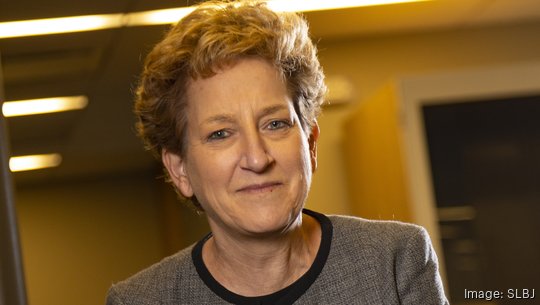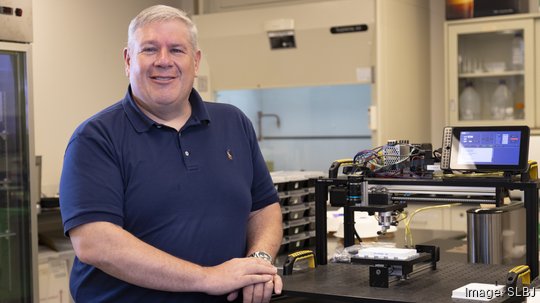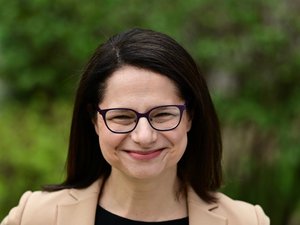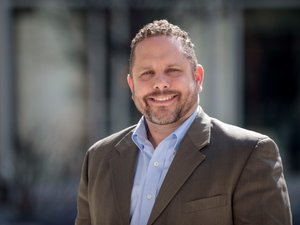Rachel Victor’s tenure at Arch Oncology ended up being shorter than she expected.
Two months after joining the St. Louis-based cancer drug startup as a research scientist, Victor was without a job, part of a staff-wide layoff as the company prepared to close its doors.
But if her stay at Arch Oncology was short, her time among the unemployed was even shorter. The afternoon after her final day at Arch Oncology, Victor had lunch with Alexander Hromockyj, chief technology officer of Impetus Agriculture, a St. Louis startup developing pest control products. A few days later, Impetus hired Victor as a scientist on its team.
Victor’s experience wasn’t an outlier. After Arch Oncology shut down, the roughly dozen people it employed in St. Louis landed quickly in new roles at local startups, including Impetus, Wugen and Confluence Discovery Technologies. Something similar happened a year earlier, when Adarza BioSystems went out of business and its nearly 40 employees were snapped up by other local companies, including nearly a half-dozen startups.
“It’s becoming the kind of community where if your startup fails, there’s other places you can quickly go,” said Impetus Agriculture CEO Martha Schlicher, who is also co-founder of another local startup, Solis Agrosciences, and chair of yet another, Plastomics.
Startups winding down operations isn't a cause for celebration, but the demise of Arch Oncology and Adarza exhibit how the St. Louis startup community has reached a key milestone: "critical mass." Though the term can mean different things to different industries, for a startup ecosystem it represents the moment in its evolution where it is large and healthy enough for one of its members to fail and still be able to reabsorb its talent.
“It’s important to reach the point where our talent pool can survive the failures that are part of this business while enjoying the big rewards that come with success," said Charlie Bolten, president of innovation hub BioSTL's startup arm, BioGenerator. "As we’ve built critical mass over the last decade, there are many examples of talented people who’ve moved between multiple different startups, whether for better growth opportunity or because the startup ran into difficulty. Such a robust environment is critical to recruiting and retaining talent.”
Reaching this so-called point of "critical mass" is a key selling point for the region when it comes to attracting entrepreneurs and other talented workers to the region, leaders say. It also helps unlock talent from within larger, local companies, giving their employees the confidence to launch their own startups without putting their own careers at risk.
Victor moved to St. Louis after earning her Ph.D. in biochemistry from the University of Arizona, just to take the job at Arch Oncology. And based upon the company's headlines at the time, it might have seemed like a safe bet.
Arch Oncology for years had been considered one of St. Louis' most promising startups, raising investment of $190 million from investors, including a $105 million Series C financing in April 2021. It's unclear why it chose to wind down operations, with the decision coming as it advanced its lead drug candidate into clinical trials to treat patients with select solid tumors and hematologic malignancies. The company's chairman and CEO each declined to comment.
Though she didn't see the company's end coming so soon, Victor said that knowing there would be other opportunities locally should the one at Arch not pan out played a factor in her decision to move here.
“I wouldn't have come to work at Arch if they were the only game in town,” Victor said.
Building critical mass
Adarza BioSystems raised funding from a who’s-who of St. Louis investors, including BioGenerator, RiverVest Venture Partners, Cultivation Capital and Lewis & Clark Ventures. All told, it raised nearly $55 million to create a testing device to help researchers in profiling diseases and drug development. But in the end, Adarza “fell just short” of being successful, said former CEO Bryan Witherbee.
Adarza folded in 2021 after struggling to generate a positive cash flow. Even though it struggled to advance its technology, one of its strengths was the quality of its staff.
“We built up a pretty good team,” Witherbee said.
When Adarza ended operations, its 40 employees — nearly all of whom were based in St. Louis — quickly landed new jobs. Some moved on to more established companies like life sciences firm MilliporeSigma and Thermo Fisher Scientific, a maker of scientific instruments. But at least a dozen moved on to other St. Louis-based startups, including Benson Hill (NYSE: BHIL) , C2N Diagnostics and Wugen. St. Louis has long been home to large companies in the life sciences and medical technology sectors, but its evolution as a hub for bioscience and agtech startups has made the field more fertile for jobseekers, Witherbee said.
“Ten to 15 years ago, there wasn’t enough startups to really fuel this,” he said.
One thing that's changed in that time is the proliferation of local venture capital investors, including Cultivation Capital and Lewis & Clark Ventures, that have launched in St. Louis and whose capital has fueled a surge in new companies. VC investment in local startups has increased 220% since 2014, from $173.4 million to $555 million last year, according to data from Pitchbook. Exits have also climbed in that time, from two in 2014 to eight last year.
Startups, by their very nature, are risky and failure is as much a likelihood as success. So "when you see more startups, you will naturally see the number of failures increase,” said Pitchbook Venture Capital Analyst Max Navas.
That’s why startup leaders say the recent outcomes at Arch Oncology and Adarza are meaningful for St. Louis: They prove that failures don't have to represent a setback for the region’s startup community.
“It’s a community that’s becoming big enough in the startup space that we can absorb some churn we all know is present in the startup community and make St. Louis more attractive and more robust for people to feel confident there will be other roles and opportunities for them to advance,” said Schlicher.

Creating resiliency
Victor's loss was Impetus Agriculture's gain. And it came just at the right time.
The agtech startup had begun its initial laboratory efforts, which focused on enhancing protein technology used in previous pesticide products to make it more effective at mitigating pests, through contract research organizations and a partnership with the University of Tennessee’s Institute of Agriculture. After tests delivered promising results, it moved late last year to open its own lab at the Helix Center Biotech Incubator in Creve Coeur. It hired three scientists to launch local operations, one of whom was Victor.
In addition to Victor, Impetus’ other local hires include employees who formerly worked at Monsanto, the agrochemical giant that’s now part of Bayer Crop Sciences. The profile of its employees highlights an important aspect of the St. Louis startup community's evolution. It’s become what Schlicher likens to a virtual corporation in which people can move from one startup to another, or from bigger firms to startups, and experience career progression.
The beneficiaries of this aren't just skilled workers. This dynamic can also make St. Louis more attractive for startups to either form or relocate here by virtue of having access to a deep pool of talent from which to source job candidates and other resources, including real estate.
Confluence Discovery Technologies, a drug development company that in 2017 was sold to Aclaris Therapeutics (NASDAQ: ACRS) for $100 million, hired a former Arch Oncology employee after that company closed. It also took over Arch's former laboratory and office space in BioSTL Building, at 4340 Duncan Ave. in the Cortex Innovation district, where Confluence already housed its headquarters.
The ability for St. Louis’ startup economy to continue growing and providing opportunities in the midst of failures not only highlights critical mass, but also, critically, the ability move on from failure.
“We’re becoming more resilient and that’s going to be really important for this ecosystem going forward. We are going to have some startups that win and we’re going to have some that fail, but we need people to be resilient to that and still invest and take a chance,” Witherbee said.
While Adarza didn’t pan out as planned, Witherbee has remained in the startup economy. He’s currently CEO of Agragene, which is developing a technology that sterilizes flies for pest control. Agragene relocated last year from San Diego to St. Louis, in part because of the talent pool locally and the availability of Witherbee to lead it.
“Adarza didn’t dampen my drive to find something to do here in St. Louis and still be a good scientist and to lead a team,” Witherbee said.

Amassing talent
While working at Monsanto, Jon Schmuke kept a sign in his office that read “remember you’re a scientist.” During his 30-year tenure with Monsanto, Schmuke moved up the ranks to a point where he was more involved in management duties than science.
So when his former Monsanto colleague, Witherbee, recruited him to Adarza in 2017 to lead research and development, Schmuke took the job. It offered a chance to be a self-described “player-coach,” putting his management skills to work while also giving Schmuke a chance to be hands-on with laboratory experiments.
While startup leaders say reaching critical mass is key to recruiting companies and employees into the region, Schmuke is an example of how it also helps to attract local talent currently working at larger, well-established companies to consider roles with startups. Schmuke said he knew working at a startup, as opposed to a well-established firm like Monsanto, included risks, as highlighted by Adarza’s decision to shut down.
But much like Witherbee, he's still employed in the startup community as president and chief technology officer at Aferna Bio, a St. Louis startup focused on developing molecular tools to improve plant growth.
“There are so many other startups now that the risk is being minimized and there’s so much opportunity,” Schmuke said.
There was once a time when someone like Schmuke would have had to return to a larger biotech firm if a job at a startup fell through. That’s changed, Witherbee said.
“They don’t necessarily depend on trying to get back in at Bayer or MilliporeSigma or Pfizer. If they enjoyed the adventure of being part of a startup and the risk taking place there, there’s opportunity,” Witherbee said.
And for those who come from outside the region, critical mass means they don’t have to return elsewhere if they want to keep working for startups, as Victor’s experience shows. Her short tenure at Arch Oncology didn’t sour her view of St. Louis’ innovation economy. Instead, her ability to land quickly at another startup now has her telling former classmates at the University of Arizona to consider St. Louis as a place to launch their own careers.
“It's not the big biotech hub that everybody thinks of, but there's a lot going on,” she said.












